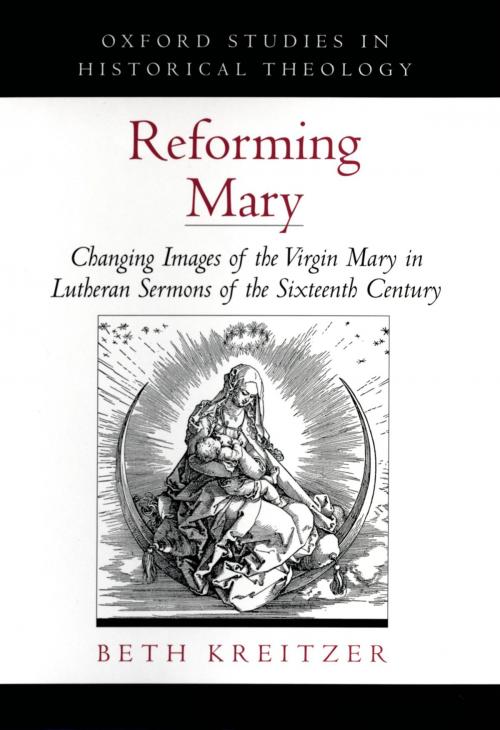Reforming Mary
Changing Images of the Virgin Mary in Lutheran Sermons of the Sixteenth Century
Nonfiction, Religion & Spirituality, Christianity, Denominations, Lutheran, Christian Sermons| Author: | Beth Kreitzer | ISBN: | 9780190290368 |
| Publisher: | Oxford University Press | Publication: | March 18, 2004 |
| Imprint: | Oxford University Press | Language: | English |
| Author: | Beth Kreitzer |
| ISBN: | 9780190290368 |
| Publisher: | Oxford University Press |
| Publication: | March 18, 2004 |
| Imprint: | Oxford University Press |
| Language: | English |
Catholics and Protestants have, since the earliest days of the Reformation, held markedly different views about the Virgin Mary. In Reforming Mary Beth Kreitzer examines the development of Lutheran views on this subject as expressed in 16th-century Lutheran published sermons, starting with the earliest of Luther's own Reformation sermons. She shows that from the beginning Lutherans rejected much of the theology and piety that surrounded Mary in Catholicism, especially her status as heavenly queen and intercessor with Christ. They affirmed those orthodox teachings about Mary that related to Christ (the Virgin's role as Theotokos, the virgin birth) and by extension Mary's purity, or perpetual virginity. As time went on Lutheran preachers showed less interest in Mary as a topic and by the later part of the century showed an increasingly harsh and critical view of her. These later sermons reveal a new willingness, in opposition to received tradition, to impute sin to Mary. Kreitzer attributes this changed attitude to the increasing distance of Lutherans from their Catholic roots, the logical results of theological changes in the Reformation, and a perception of an increased threat of re-catholicization. Finally, she shows, Mary was pressed into service by preachers who endeavored to instruct the laity in both what to believe and how to live, making a causal connection between being a good Christian and being a good citizen of society. In this context, Mary was used as a role model and was often promoted as an exemplar for females in ways that served to constrain and domesticate women, placing them more firmly under male authority. But despite the attempts by preachers to domesticate and mold her, Kreitzer argues, the Lutheran Mary remains a complex and paradoxical figure.
Catholics and Protestants have, since the earliest days of the Reformation, held markedly different views about the Virgin Mary. In Reforming Mary Beth Kreitzer examines the development of Lutheran views on this subject as expressed in 16th-century Lutheran published sermons, starting with the earliest of Luther's own Reformation sermons. She shows that from the beginning Lutherans rejected much of the theology and piety that surrounded Mary in Catholicism, especially her status as heavenly queen and intercessor with Christ. They affirmed those orthodox teachings about Mary that related to Christ (the Virgin's role as Theotokos, the virgin birth) and by extension Mary's purity, or perpetual virginity. As time went on Lutheran preachers showed less interest in Mary as a topic and by the later part of the century showed an increasingly harsh and critical view of her. These later sermons reveal a new willingness, in opposition to received tradition, to impute sin to Mary. Kreitzer attributes this changed attitude to the increasing distance of Lutherans from their Catholic roots, the logical results of theological changes in the Reformation, and a perception of an increased threat of re-catholicization. Finally, she shows, Mary was pressed into service by preachers who endeavored to instruct the laity in both what to believe and how to live, making a causal connection between being a good Christian and being a good citizen of society. In this context, Mary was used as a role model and was often promoted as an exemplar for females in ways that served to constrain and domesticate women, placing them more firmly under male authority. But despite the attempts by preachers to domesticate and mold her, Kreitzer argues, the Lutheran Mary remains a complex and paradoxical figure.















